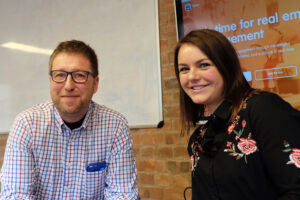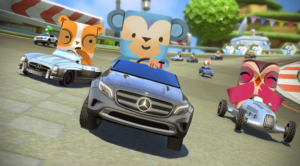
25th March 2018
Mario Kart with Marcus and the drivers of engagement

This week I sat down with Marcus Thornley, Founder of Play Consulting & Totem who are one of The EEA’s most recent partners.
When I first met Marcus I was blown away by his passion, his experience and his personal take on engagement. I’m delighted to be able to bring you into our chats (and gaming sessions) today.
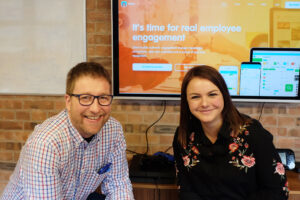
Take 20 minutes, grab a cuppa, get your headphones on and sit back and listen to to the incredible Marcus on all things engagement and gaming!
If you’re not able to take a listen, we’ve also got you a summary of the conversation below:
I am super excited to be at the offices of PLAY with CEO Marcus Thornley to learn more about Totem. Spun out of the gaming industry everything about Totem, it’s people and culture all stems from their games know-how and building compelling digital products that are driving positive behaviours.
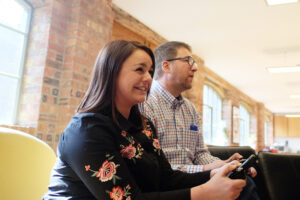 Playing games like Mario Kart is very serious business for these guys, even it’s not as serious for me! They’ve built their own digital leaderboard and appoint an MK mentor for all new employees. So catching up with Marcus, I’ve had no choice but to actually sit down and play some games today too…
Playing games like Mario Kart is very serious business for these guys, even it’s not as serious for me! They’ve built their own digital leaderboard and appoint an MK mentor for all new employees. So catching up with Marcus, I’ve had no choice but to actually sit down and play some games today too…
Thanks for giving me your time today Marcus. So let’s start with the crucial question –
What does employee engagement mean to you?
I’m not even sure employee engagement is the term we’ll be using in the future, but I think it works for now! For us, it’s trying to create an environment where people are incredibly and emotionally engaged in their work and the purpose of the business. It’s a catch all for lots of things, it’s certainly not “we’re running employee engagement so we must have an annual conversation with our employees” – it’s more deep rooted and cultural than that. We’re trying to understand the relationship between employer and employee, what it should be and how it’s going to change. It’s understanding what does work mean, what does the future of work look like, and how can organisations structure themselves for mutual benefit; for the organisation and for the individual to drive happiness at work.
There’s a lot of talk about gamification, it seems to be the latest trend and is it just going to be a fad for this year … what has gaming got to do with engagement?
In a past life I worked for Electronic Arts, involved with games like Fifa and Sims and other big titles, and I never once heard the word gamification used. I suspect it’s a word coined by some consultants a few years ago. There’s a lot of tosh talked about gamification and the view that if you chuck a leaderboard, some points or badges on a platform, it elevates it to something better, which absolutely isn’t the case. It’s about the approach you take and creating products that are so laser focused on the user or player and creating an environment that’s so fun and compelling that it repositions work to play – to reposition things that you have to do, to things that you want to do.
At Play, we’ve got an agency part of the business and Totem; much of the agency side takes a gamified approach to solving workplace problems and we’ve seen it have huge impact across all sorts of clients – whether that’s utilities, media, retail or financial services companies. By taking a gamified approach (we talk about a gamified approach, rather than gamification), we’ve seen real success in driving habit formation and repositioning the world of work where it’s centred on the needs of the user, as opposed to solely on the needs of the business.
That’s the agency side of the business PLAY Consulting, tell us a bit about why you decided to build Totem?
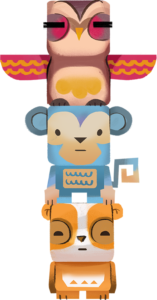 We set up the business with a mission to work with very large companies and use game approaches to drive behaviour at work. We soon realised there was a pattern of repeatable problems in all sorts of companies, which stemmed from how the business related to the individual and the individual related to the business. At the time we knew nothing about employee engagement, but we could see that small teams of highly autonomous, motivated employees could be hugely successful. If we could create a platform that would drive the right kind of culture then we could deliver great business performance results in large companies and make work more pleasant and satisfying. So we built a Totem minimal viable product and offered it to some of our clients who were investigating employee engagement and it absolutely took off! So for the last 18 months we’ve been iterating and releasing and it’s been great. What really strikes me is the breadth of businesses using it – Hakkasan in hospitality or Leeds Building Society in financial services or Vodafone in retail or PwC in professional services.
We set up the business with a mission to work with very large companies and use game approaches to drive behaviour at work. We soon realised there was a pattern of repeatable problems in all sorts of companies, which stemmed from how the business related to the individual and the individual related to the business. At the time we knew nothing about employee engagement, but we could see that small teams of highly autonomous, motivated employees could be hugely successful. If we could create a platform that would drive the right kind of culture then we could deliver great business performance results in large companies and make work more pleasant and satisfying. So we built a Totem minimal viable product and offered it to some of our clients who were investigating employee engagement and it absolutely took off! So for the last 18 months we’ve been iterating and releasing and it’s been great. What really strikes me is the breadth of businesses using it – Hakkasan in hospitality or Leeds Building Society in financial services or Vodafone in retail or PwC in professional services.
The key metric for us is, do the users love it and does it reposition their notion of work and help them feel more engaged? So we look at the same metrics as we would in a game; daily active users, weekly users, churn rate, percentage of engaged users – all metrics which are super super high. It tells us we’re doing something right, as not every product deserves to exist and it’s really important to be self critical every day.
You mentioned some clients there which seems to be growing on a weekly basis whenever we speak, what is the key takeaway from working with them all?
We don’t have a sales team and I think we’ve been successful because there is a growing feeling and acceptance in the world of work that something has to change. The way we have been organised, in a very hierarchical, command and control way, no longer works anymore. When Henry Ford organised his factories, he said all he needed was hands but they came with brains attached, he just needed people to carry out automatic tasks. But the robots are here or it’s all been offshored, and the way we classically organise ourselves in business is no longer fit for the age we’re in. The people at the bottom of this pyramid are now the most important – it’s the person who picks up the phone, works in the store, interacts with the customer that’s the most important person, and companies need to optimise around that.
There’s a lot of platforms coming out linking tech to business results, what makes Totem different?
On paper we’re a tech startup, you’ve seen the team – hardcore tech and hardcore designers! We realised pretty quickly however that we weren’t a tech startup – that it’s just about culture. Technology is the vehicle which can drive behaviours and culture, but it’s nothing in itself.
How different are we? There are elements in Totem which are seen on other platforms – we didn’t invent the newsfeed, plenty of people do that, but I hope we do communication and community really well.
Recognition is really important to us, and not just bottom down, but side to side and bottom up. The feedback loop, ensuring the shortest time possible between me doing something and getting the recognition for doing it is important, so we have a gamified recognition engine within Totem. Not many people have that. A lot of platforms tie rewards back to transactional stuff which we don’t do, we’re firm believers that work doesn’t need more money drivers.
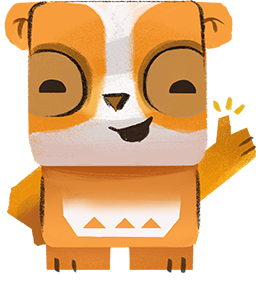 The third piece of Totem which I haven’t seen anyone else do in the workplace is this notion of giving data to the people who can optimise that data. Take Fitbit, it gives you your steps and by virtue of you having your steps you have a baseline by which to optimise, and we’ve just taken that concept into the world of work.
The third piece of Totem which I haven’t seen anyone else do in the workplace is this notion of giving data to the people who can optimise that data. Take Fitbit, it gives you your steps and by virtue of you having your steps you have a baseline by which to optimise, and we’ve just taken that concept into the world of work.
Over and above the feature set though, what makes Totem really different is the bottom up view it takes of the workforce. That wherever you are in the organisation you can be an author and not just a passive reader in the newsfeed; that recognition isn’t something that is bestowed on you, it’s something that everyone can own; that data doesn’t just sit with management, it’s given to the people on the ground so they can make great decisions.
What’s next for Totem?
We’re very good at giving users accessible data that they can understand and optimise around. We’re now working to transform the content management system to allow businesses insights that they couldn’t get anywhere else. This doesn’t mean insight for insight’s sake, but insight that can drive action immediately. The other big piece is around rollouts – we have a lot of clients coming onboard, so we need to grow our support capabilities.
Then, looking at the business generally, this notion of who you are and what you do needs to be seamlessly one in the same at Play – it can’t be schizophrenic. So, just as we’re trying to drive culture in businesses, it’s very important we also do this internally. We have a lot of growth coming in terms of headcount, so we need to keep our culture as the business grows.
Thanks Marcus. It’s been so so interesting having this chat and if anyone is interested in hearing more we’ll be running a webinar with Totem on the 10th May.
We also have our summer party on the roof here on 28th June.
Also a breakfast event here where you can meet the team, learn more about gaming and engagement and its impact on business success, potentially play a game or two – 4th July!
If you want to know more about Totem, don’t forget there is a discount for EEA members, do get in touch.
Huge thank you Marcus!
